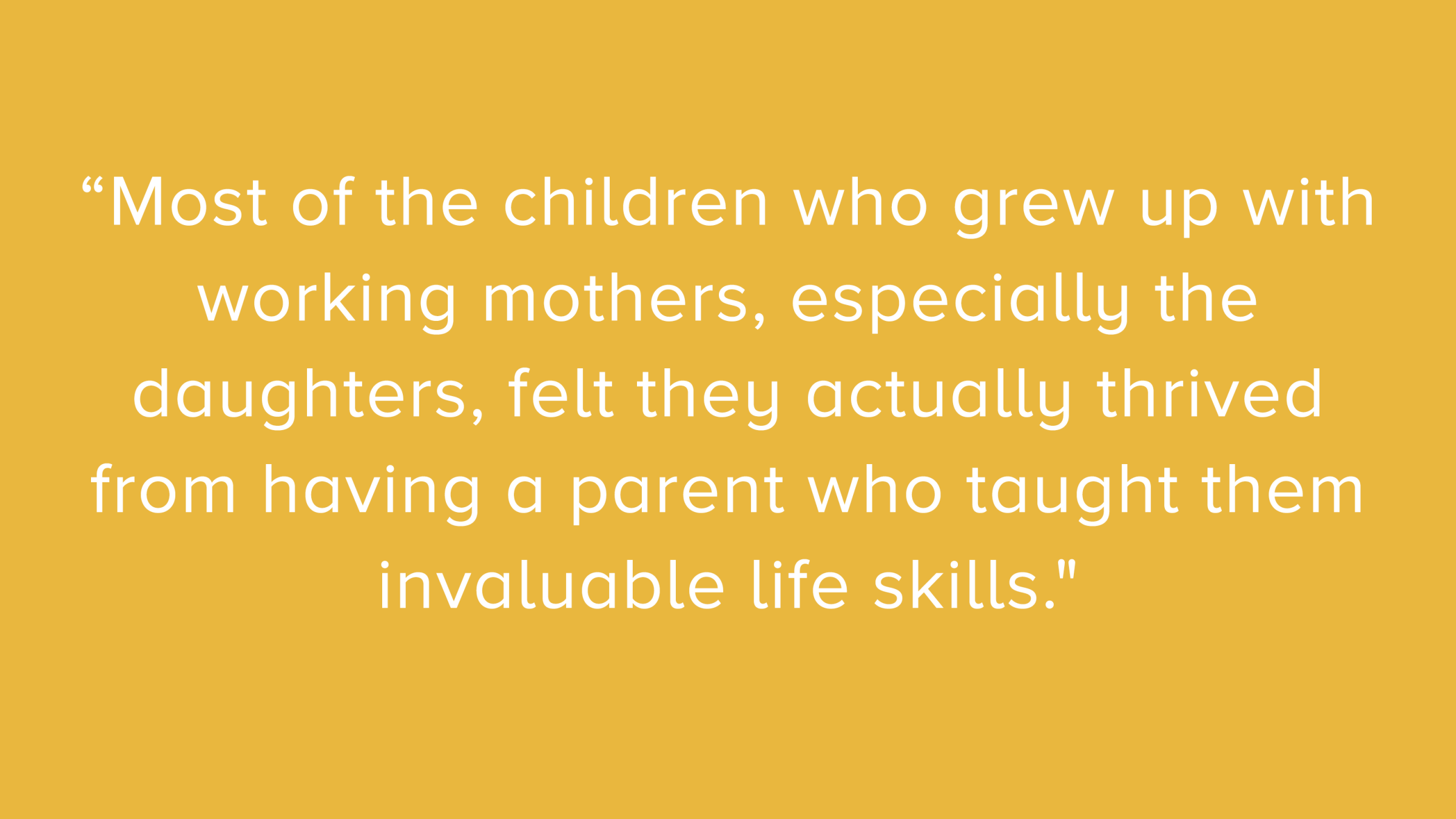
In the U.S., 70% of women with children under the age of 18 are in the workforce, according to the U.S. Department of Labor—but a Pew Research survey indicates that 60% of U.S. adults say they still think children are better off with one parent at home.
This disconnect is stunning to me—especially since I raised two children while working as one of the first female executives on Wall Street. It’s also key to note here that many of the women working in the U.S. don’t have the option of dropping out of the workforce because of any perceived benefit to their children; they simply need to pay the bills.
So to find out where the truth lies, I surveyed more than 1,000 people from the ages of 23 to 44, some of whom had working mothers and some of whom had moms who stayed home. I also interviewed some working mothers and their children (not the same children as in the survey).
As it turns out, most of the children who grew up with working mothers, especially the daughters, felt they actually thrived from having a parent who taught them invaluable life skills. All mothers work hard to prepare their children for adult life, but according to my survey, 56% of daughters whose mothers worked said their moms were very helpful in teaching them to be independent (compared to 35% of daughters whose mothers stayed at home).
“I wouldn’t trade what I got from her for the world,” one daughter told me. I heard this sentiment again and again. “I would definitely encourage moms to stay in the workplace,” said another. “It was an inspiration to me that my mother worked. I have huge respect for her.” In fact, 50% of daughters surveyed said their working mothers were very helpful in instilling a strong work ethic in them, versus 32% of daughters whose mothers stayed at home.

The question we should be asking isn’t whether a parent should stay home, but whether children turn out any differently if the mother works—and my research says no. The children of working mothers were just as happy, attended college just as often, were employed just as often and had families at the same rates as children whose mothers stayed at home.
In addition, the children said they were proud of their working mothers, who provided positive role models, taught them problem-solving and continued to be mentors long into adulthood.
Read more: Gayle King: How to Let Go of Working Mom Guilt
Why might having a working mother not have the negative impact on children’s success that so many people seem to assume it does? For starters, many women who aren’t in the work force are very busy, too, often as community leaders; they may not have a paying job, but that doesn’t mean they spend all of their time with their children.
What’s more, much of the interaction between mothers and children takes place after work hours, especially since children are increasingly busy with pre-school or school, sports and other activities.
Watch some of the world’s most powerful women share their personal mottos:
Granted, society’s views about working moms and the impact they have on their children have improved over time. In 1985, 55% of adults said that “a pre-school child is likely to suffer if his or her mother works”—but by 2012, only 35% of adults agreed with that statement. Still, the stigma remains.
Read more: It’s Time for Women to Take Back the Word ‘Selfish’
I was at an out-of-town meeting recently when a working mother mentioned it was her daughter’s birthday and a man said, “Don’t you feel terrible missing it?” The mother wisely replied, “My children know all birthdays happen on weekends.”
Let’s step back a bit and consider the recent history of working mothers. When I entered the workforce, the feminist movement had convinced me that I could handle work and family without any problems. My generation had no role models since the women before us didn’t return from maternity leave. Unfortunately, though, the “sisterhood” of the feminist movement didn’t follow us into the workplace.
When women had children and came back to work, we were often in our own silo, isolated and insecure. There were no listservs of working moms to reach out to for support (in fact, there was no email!). No LinkedIn groups of working mothers. No Facebook friends from which we could crowd-source advice. It was much tougher than anyone told us it would be, but we put our heads down, did our work and cared for our families.
Read more: ‘I’ve Struggled with Seeing Myself as a Career Woman Ever Since I Became a Mother’
My generation of working mothers raised happy, successful children, but we failed to advertise this important point to the larger community around us. This next generation of working mothers is doing a much better job than we did of staying connected with each other, sharing ideas and providing support, but I implore you: Working mothers of this generation and the previous one, please start (or continue!) talking about how you figured it all out and pass on words of advice. Stand up, and be part of the conversation. We owe it to our daughters, sisters, nieces and friends to have this dialogue.
Because as one of the women I interviewed tells her younger colleagues: “Being a working mother is the hardest thing you’ll ever do, but I wouldn’t trade it for anything.”
Pamela F. Lenehan was an early female partner on Wall Street and is the author of My Mother, My Mentor: What Grown Children of Working Mothers Want You to Know.
More Must-Reads from TIME
- Why Biden Dropped Out
- Ukraine’s Plan to Survive Trump
- The Rise of a New Kind of Parenting Guru
- The Chaos and Commotion of the RNC in Photos
- Why We All Have a Stake in Twisters’ Success
- 8 Eating Habits That Actually Improve Your Sleep
- Welcome to the Noah Lyles Olympics
- Get Our Paris Olympics Newsletter in Your Inbox
Contact us at letters@time.com